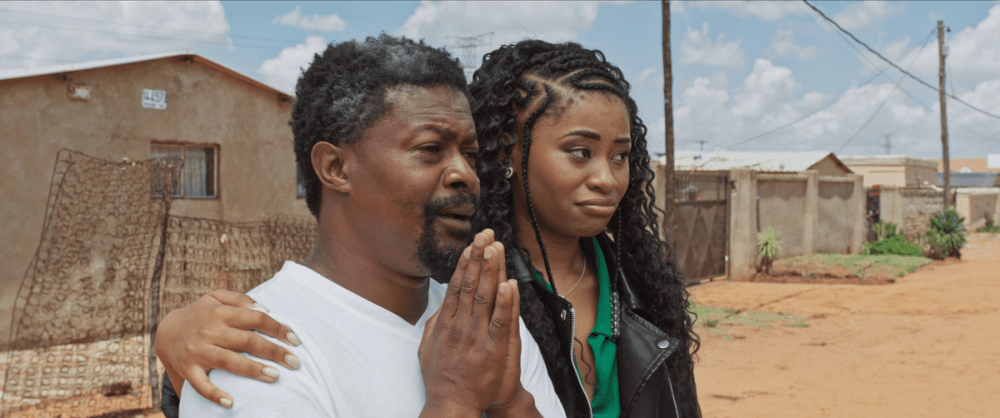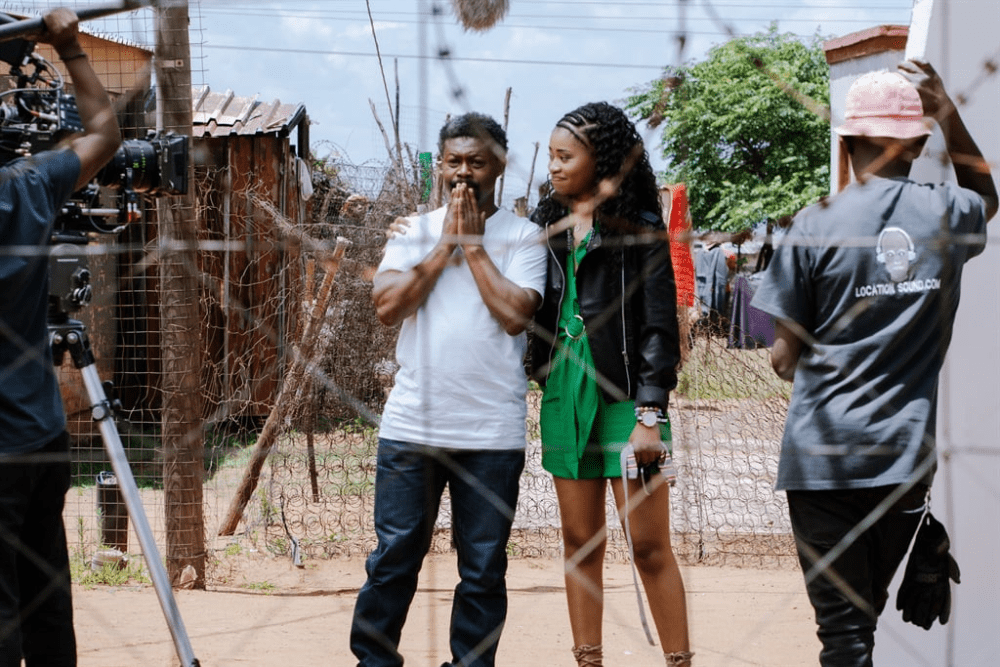Lerato get your gun: Thami Radebe, played by Kagiso Modupe, who is also the executive producer, and his daughter, the eponymous Lerato, played by Nefisa Mkhabela, in Losing Lerato 2. Photo: Netflix
Sequels can either elevate or deflate their predecessors. It is seemingly the latter for the recent Netflix addition Losing Lerato 2, the much-anticipated follow-up to 2019’s multi-award-winning Losing Lerato.
Holding people hostage in a fraught effort to save a loved one is still the golden thread holding the plot together. The sequel is also a story of how unconditional love, loyalty and sacrifice can move mountains.
After her father Thami Radebe (Kagiso Modupe) is released from prison on medical parole, Lerato (Nefisa Mkhabela) will do anything to ensure they are not parted again.
This desperation to help her ailing father leads to dramatic events reminiscent of Denzel Washington’s 2002 John Q., in which his character has to find an organ donor.
Due to audiences’ tendency to compare local films to American ones, originality becomes a contested topic.
Hollywood aside though, Losing Lerato 2 does bravely make its point as an action-drama feature. It fits the mandate: heartfelt moments and unbreakable bonds between characters who fear losing each other, laced with dramatic tension.
The sequel continues to delve into societal issues, such as fatherhood.
Also serving as executive producer, Modupe’s concept for the two films was inspired by his strained relationship with his own father.

In this sequel, Thami is older, slower and accepting of his imminent death. Though he doesn’t take centre stage, you can still empathise with his hard-knock-life character.
Reconnecting over cake and stok sweets (lollipops) after missing key milestones, the father and daughter relationship tugs at the heartstrings.
In a country where some men rape and murder women, including their daughters, deep father-daughter bonds such as Thami and Lerato’s are sunshine in a cold world. Fatherhood is no walk in the neighbourhood park, though.
The two films portray a different kind of black father, not often seen. Thami’s commitment to his daughter — imperfect as it is — is testament that not all fathers are sperm donors doing Olympian sprints away from their responsibilities.
However, Losing Lerato 2’s flaws taint both one’s watching experience and appreciation of the first, classic film. For viewers who haven’t seen the first, flashbacks offer some context and continuity.
Generally, in filmmaking, flashbacks are not only meant to offer clarity and meaning but also create mystery about a character’s past, for instance. The use of flashbacks in this case however is aplenty.
One is not even deeply stirred to see the previous film because all has been revealed. Worse, though, there are flashbacks in the sequel of scenes one has seen a few minutes ago.
The best use of this plot device is when Thami reads his daughter’s letters, accompanied by voiceovers of a child maturing into a young adult.
The casual carrying of a gun — mostly with one hand — by Lerato is another unconvincing and baffling element of Losing Lerato 2.
Are guns not supposed to be a bit heavy and daunting, especially for someone who has never used one before? The easy gun-wielding and tapping on the head seem unrealistic.
The police detective scenes outside the hospital are also feeble — or perhaps I have watched too many international cop shows to fully appreciate director Zolani Phakade’s talent.
The anomalous Xhosa script written by Dineo Langa, who also plays Joyce Grootboom, was a miss. I preferred her natural Setswana in last year’s crime-thriller Unseen.

The lamentations of Dr Xolani (Aubrey Poo) about office romances, as an attempt at character depth, fail to either elevate the story or offer compassion to his character and that of the others held hostage at a hospital.
I couldn’t fully empathise with their fears and their realisation that they might lose their lives.
One of the film’s brighter parts was seeing new faces on the global-streamer screen, such as Skeem Saam’s Lerato Marabe and Kea Leburu.
The veteran Zolisa Xaluva, who portrays the minister of health, or “Daddy Chief”, had me in stitches as the script realistically reveals a self-absorbed political leader.
The stellar cast also includes Samela Tyelbooi, Mapaseka Koetle and Nolwazi Shange.
Losing Lerato 2 touches on matters reflective of our country: the failing public health sector, with added pressure from load-shedding, and the abuse of power by political elites regarding organ transplant issues.
The question of sacrifice and desperation remains. What would you have done if you were in Lerato’s situation? When pain, anger and fear have clouded decision-making faculties, what better choices would you have made to save the one you love?
The film’s dramatic and emotional excursion is launched and concluded with original music in the form of — K.O’s On The Way.
Produced by Madupe’s Bakwena Productions, Losing Lerato 2 is an average addition to the South African action-drama genre. Whether it will receive multiple accolades, as its predecessor did, remains to be seen. Whether it deserves them, is another question, of course.